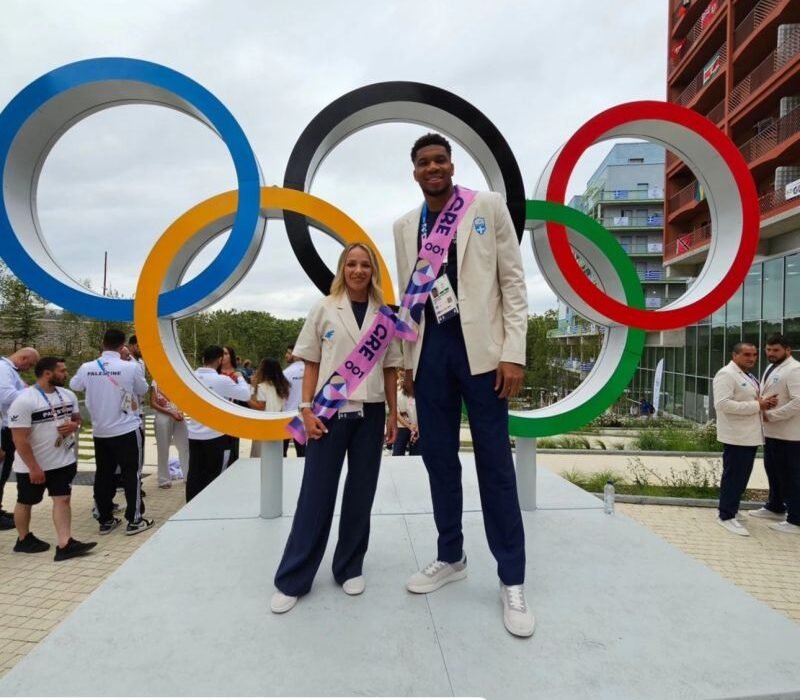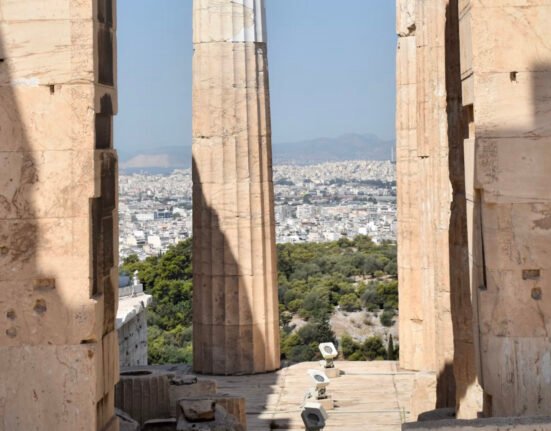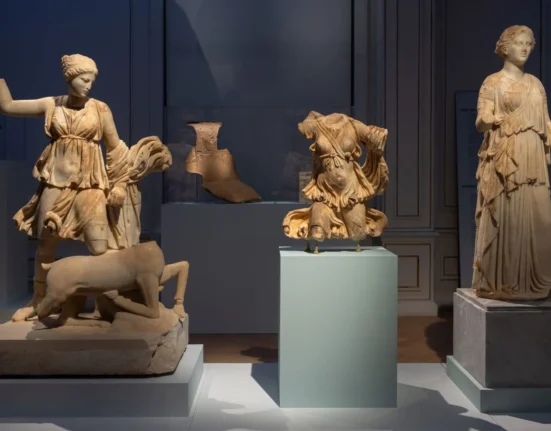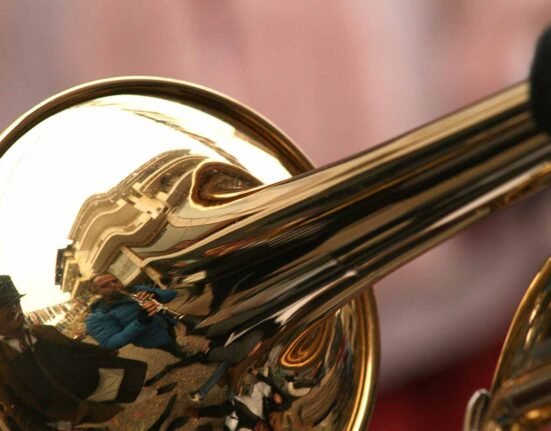As the excitement of the 2024 Paris Games fades, it’s the perfect moment to delve into the origins of this timeless tradition. Greece, the birthplace of the Olympics, invites you to uncover its rich history and epic secrets. Transitioning from the modern marvels of Paris to the ancient roots of the Games, Greece offers a unique opportunity to explore the actual sites and rituals that have shaped this globally unifying event for centuries. To gain a deeper appreciation of the Olympic spirit, seize the opportunity to visit Greece’s iconic sites: the Museum of the History of the Ancient Olympic Games in Olympia, the Archaeological Museum of Olympia, and the Archaeological Site of Olympia, where the ancient Olympics were held from 776 BCE through 393 CE. Also, visit the Panathenaic Stadium, or Kallimarmaro, in Athens, the historic marble venue that hosted the revival of the modern Olympics in 1896 after a 1,503-year hiatus. Finally, explore the Athens Olympic Museum, which celebrates the modern Olympic Games and their return to Greece in 2004.
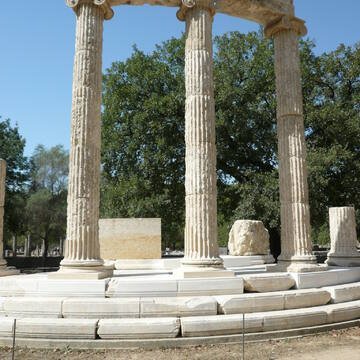
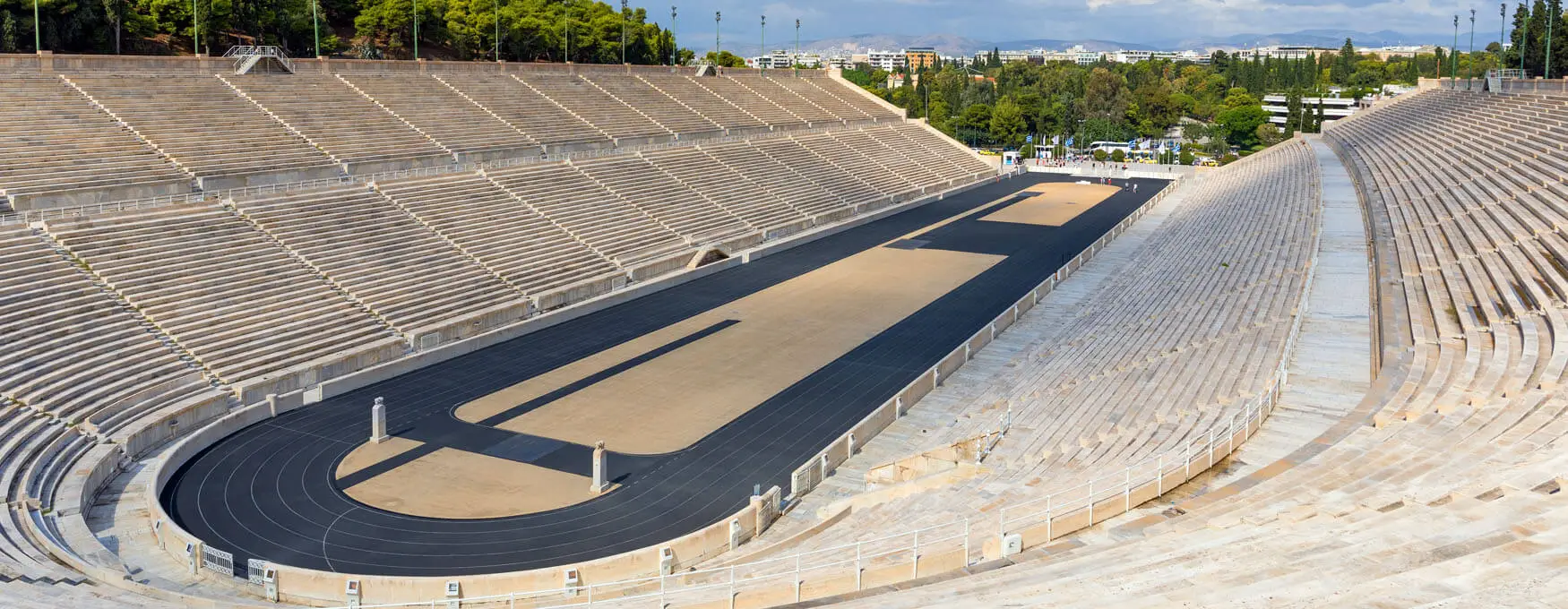
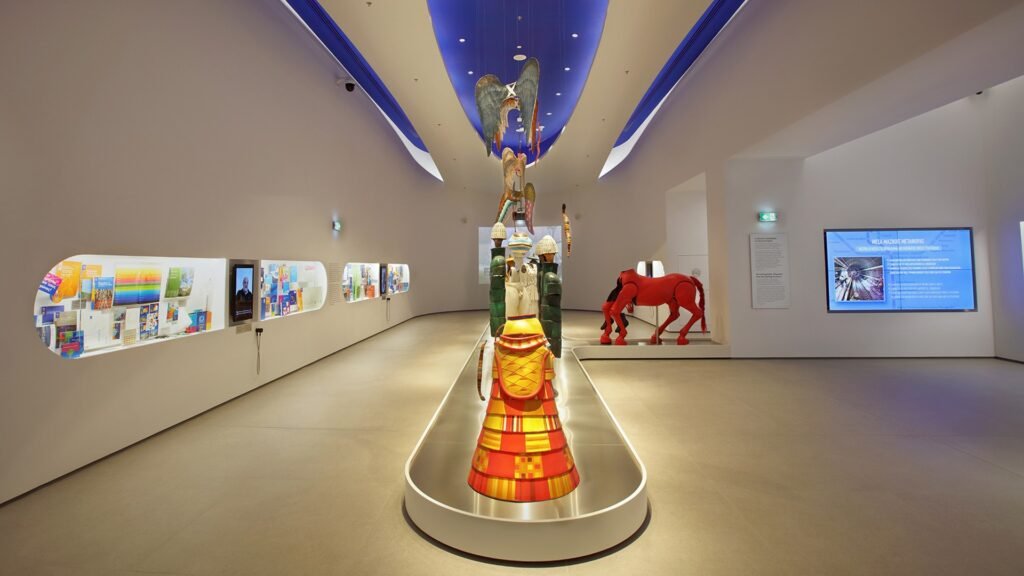
Credit: athensolympicmuseum.org
To fully appreciate Greece’s enduring influence and the significance of its heritage sites, it’s essential to explore the rituals of the Olympic Games and how they reflect Greece’s foundational role. Using the 2024 Paris Olympics—a contemporary example still fresh in our memories—this article will examine how these rituals underscore Greece’s lasting impact on the modern Games. This exploration reveals that Greece’s role is not merely historical but a living, breathing, and integral part of every Olympic Games.
The Eternal Flame and the Torch Relay: Bridging Ancient Truce and Modern Conflicts
A Pensive Juxtaposition: Ancient Ideal vs. Modern Strife
We cannot begin to juxtapose the ancient and modern Olympic rituals without confronting a poignant reality: in antiquity, the lighting of the Olympic flame signaled a cessation of hostilities through the “Olympic Truce” or “Ekecheiria,” established in the ninth century BCE to ensure safe passage and peaceful competition among athletes from warring city-states. Today, however, the modern Games are overshadowed by ongoing conflicts, with the 2024 Olympics marred by the wars in Eastern Europe and the Middle East. This stark contrast moves us further from the vision of Pierre de Coubertin, who revived the modern Olympics in the late 19th century with the hope of fostering global peace and friendly competition. The gap remains wide, as nations struggle to set aside their differences and truly embrace the spirit of the Games.
The Lighting of the Olympic Flame
In ancient Greece, the lighting of the Olympic flame was a sacred ceremony that took place at the sanctuary of Olympia. The flame was kindled by the sun’s rays using a concave mirror, symbolizing life, unity, and the shared values among athletes from various city-states. It was kept burning throughout the Games in the Prytaneum, serving as a symbol of the era’s commitment to peace and cooperation.
The Olympic Flame Lighting Ceremony for Paris 2024
On April 16, the flame lighting ceremony for the Paris 2024 Games took place at the historic grounds of Olympia, blending ancient rituals with modern touches. Before the ruins of the the Temple of Hera, the high priestess invoked Apollo to light the flame. Due to overcast skies, the flame could not be ignited using the sun’s rays, so a backup flame, previously kindled, was used to maintain the ceremony’s sanctity. Accompanied by dancers portraying Kouroi, the high priestess performed a ritual inspired by ancient customs. The flame was then placed in a ceremonial urn and carried to the ancient stadium by Hestiada, the keeper of the fire. It was, finally, handed to the first torchbearer, along with an olive branch, marking the beginning of the Olympic torch relay and reinforcing the timeless message of peace and unity.
The Olympic Torch Relay: From Greece to Paris, a Journey of Light and Unity
The Olympic Torch Relay, echoing the ancient messengers who once proclaimed the ekecheiria (sacred truce), began with the Greek Olympic rowing gold medalist Stefanos Ntouskos as the first torchbearer. This relay, involving 11,000 torchbearers, spanned Greece before continuing through France, underscoring the Olympic ideals of peace and unity. The route through Greece paid homage to historic sites and celebrated the enduring connection between Greece and France.
On April 26, the torch arrived at the Panathenaic Stadium in Athens, where it was ceremonially handed over to the Paris 2024 organizers. The next day, the flame set sail for France aboard the ship Belem. Over the course of 68 days, it traveled through 65 French territories, culminating in Paris for the opening ceremony on July 26.
At the culmination of the relay, the Olympic cauldron was ignited by French sporting icons Marie-José Pérec and Teddy Riner, who were the last torchbearers. Departing from tradition, this year’s cauldron, which soared 200 feet into the air at night, created the illusion of a floating ring of fire, achieved with the aid of a balloon resembling a hot air balloon. This modern twist added a dramatic flair to the traditional symbol of the Games, embodying the enduring spirit of peace and solidarity.
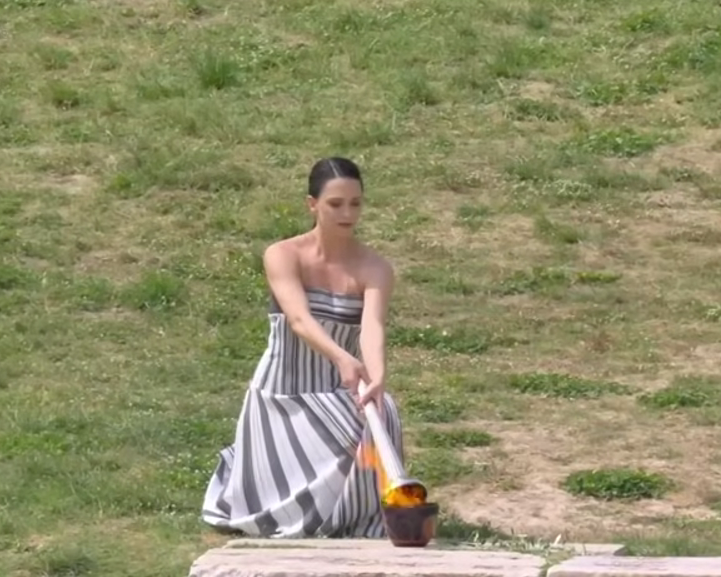
Credit: Screenshot ERT1
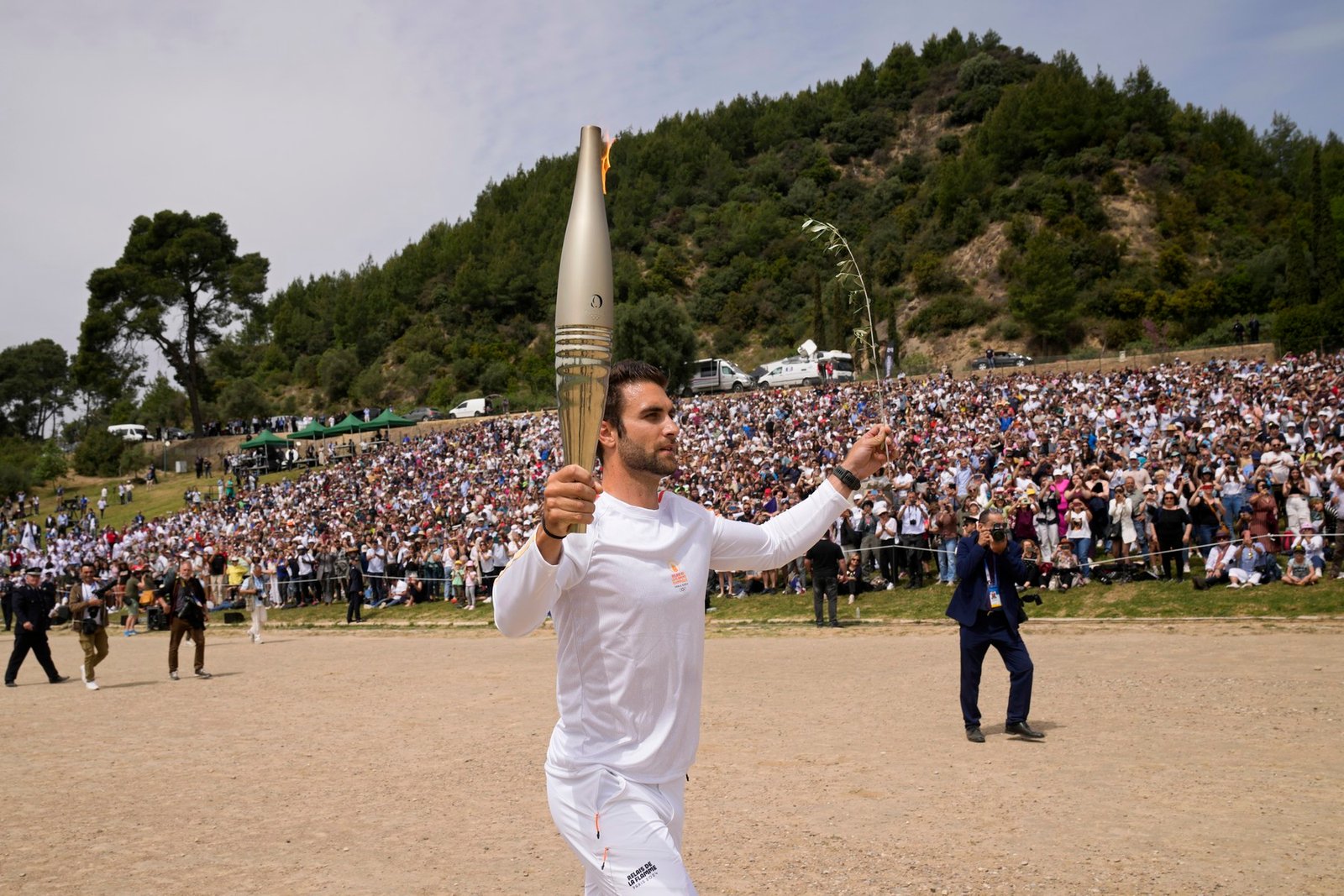
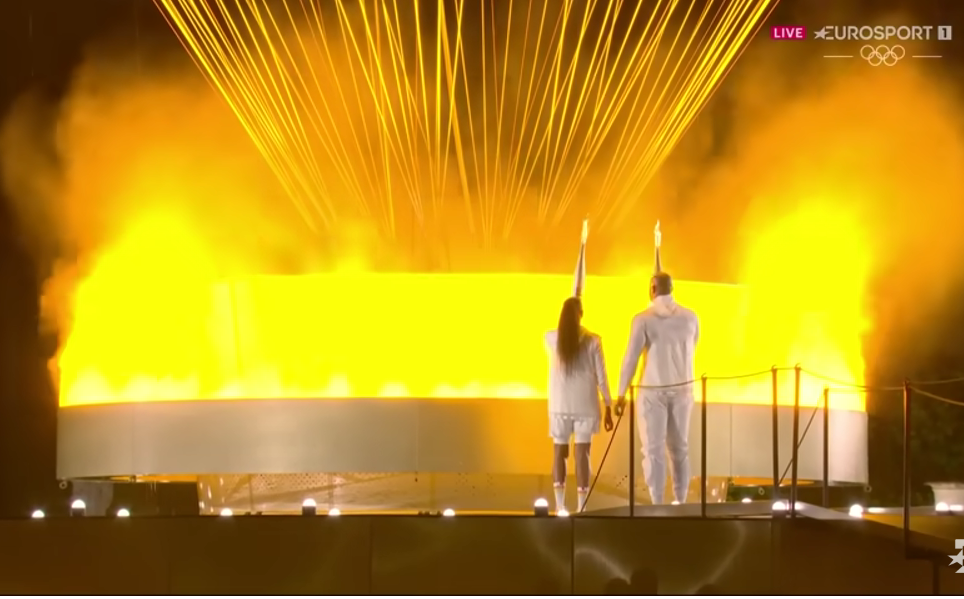
Greece Leads the Olympic Parades: A Tradition Deeply Embedded in History
At the 2024 Paris Olympics, Greece upheld its traditional role at the head of the Olympic parades during both the opening and closing ceremonies.This practice, established during the revival of the modern Games in 1896, highlights Greece’s foundational importance in Olympic history and reaffirms its lasting influence on the contemporary Games.
As tradition dictates, Greece initiated the Parade of Nations at the Opening Ceremony, making a striking entrance aboard a festively decorated boat. Athletes waved the Greek flag as the crowd cheered. Notably, flag bearers Antigoni Drisbioti and Giannis Antetokounmpo led the Greek contingent, with Antetokounmpo achieving a milestone as the first Black flag bearer for Greece.
In the Closing Ceremony, Greece once more took center stage. Athletes Emmanouil Karalis and Evangelia Platanioti led the parade of nations at the Stade de France, reinforcing Greece’s central role in Olympic tradition.
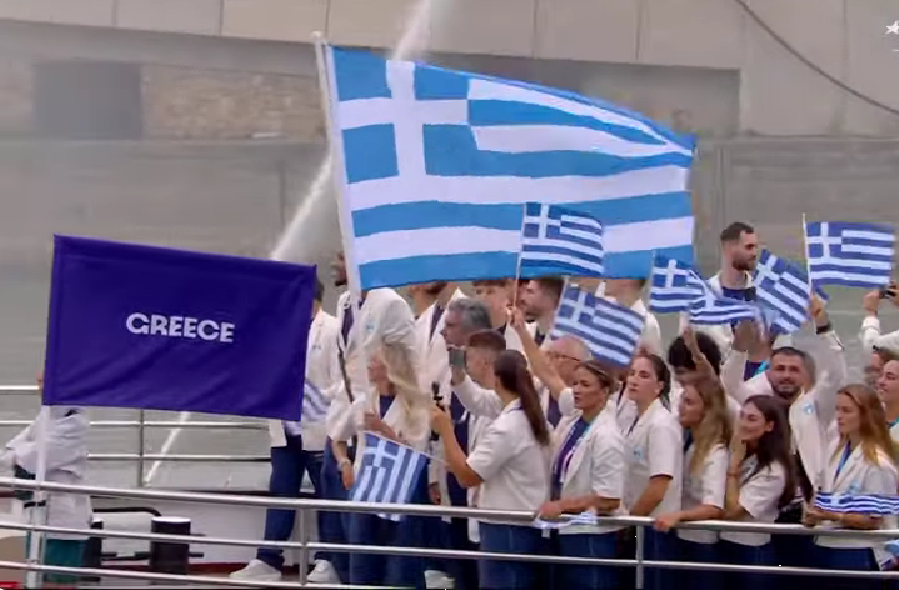
Paris 2024. Credit: Screenshot Eurosport
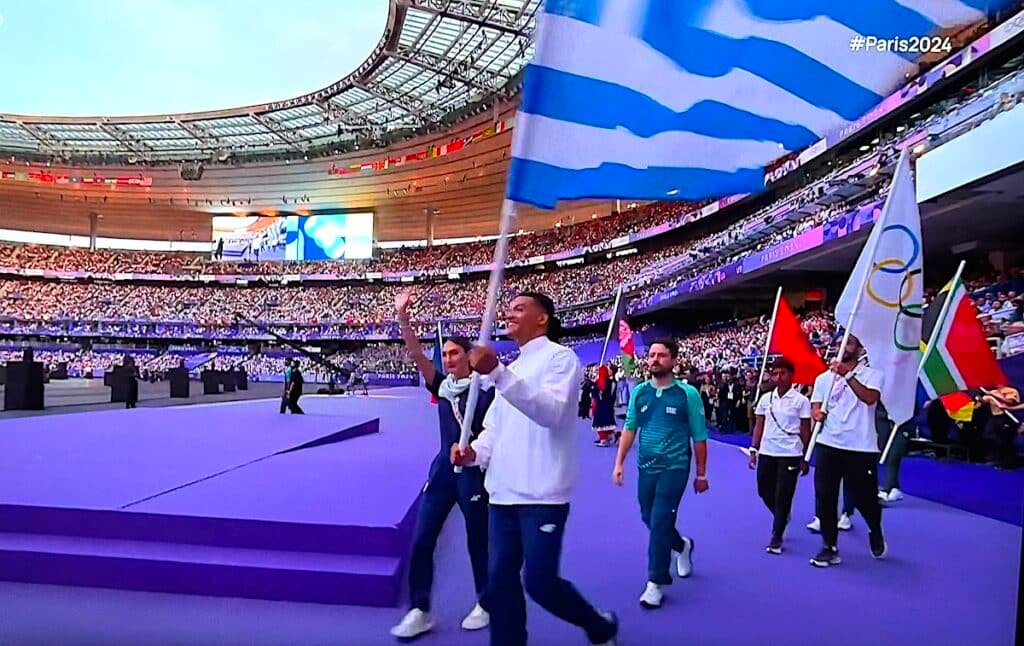
France’s Special Tribute to Greece at the 2024 Olympic Games Closing Ceremony
In line with Olympic tradition, the closing ceremony typically includes the raising of the Greek flag and the playing of Greece’s national anthem, honoring the country’s pivotal role in Olympic history. At the 2024 Paris Olympics, however, France’s tribute to Greece transcended these traditional gestures. The ceremony intricately wove the Greek flag and anthem into an elaborate artistic performance, offering a profound homage to the birthplace of the Games.
A central moment of the ceremony saw the Golden Voyager, a striking figure cental to the performance, raise the Greek flag. This powerful act, combined with the resonant playing of the Greek National Anthem, filled the Stade de France with a deep sense of reverence. The flag was prominently displayed at the heart of the stadium, symbolizing the enduring strength and spirit of the Olympic Games amidst global challenges. The tribute was further enhanced by the spotlight on a replica of the Winged Victory of Samothrace, which is a Greek statue of the goddess Nike that resides in the Louvre museum.
The ceremony was complemented by a performance of Fauré’s Hymne à Apollon (Hymn to Apollo), with pianist Alain Roche performing while suspended in mid-air and tenor Benjamin Bernheim delivering a powerful vocal performance. Together, these elements created a breathtaking tribute that celebrated Greece’s profound impact on the Olympic movement.
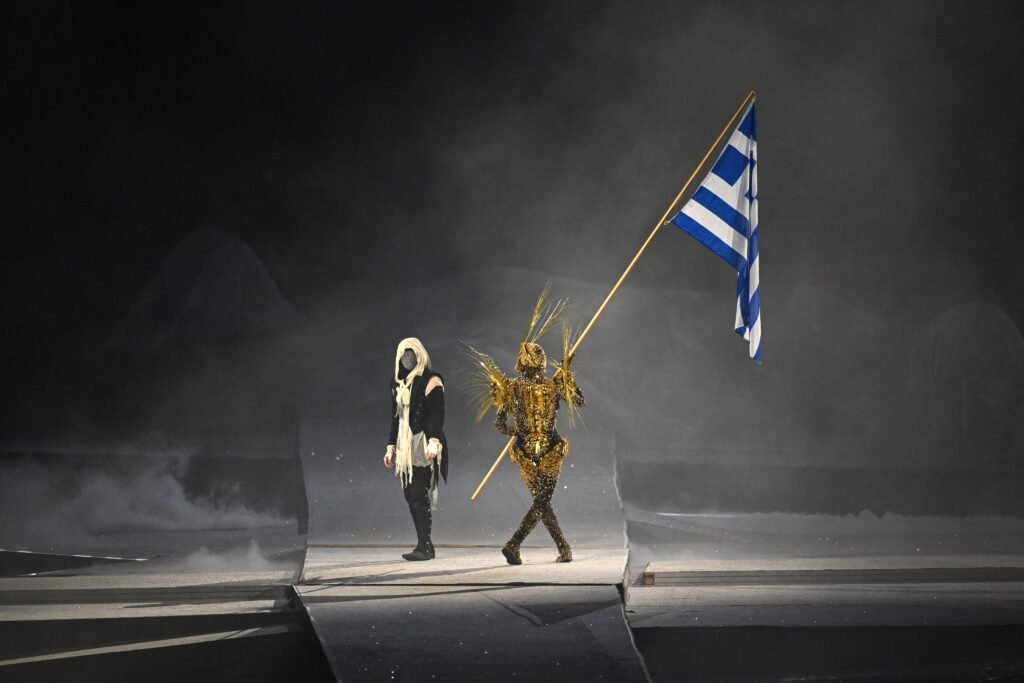
Credit: The Olympic Games (@Olympics) via Twitter
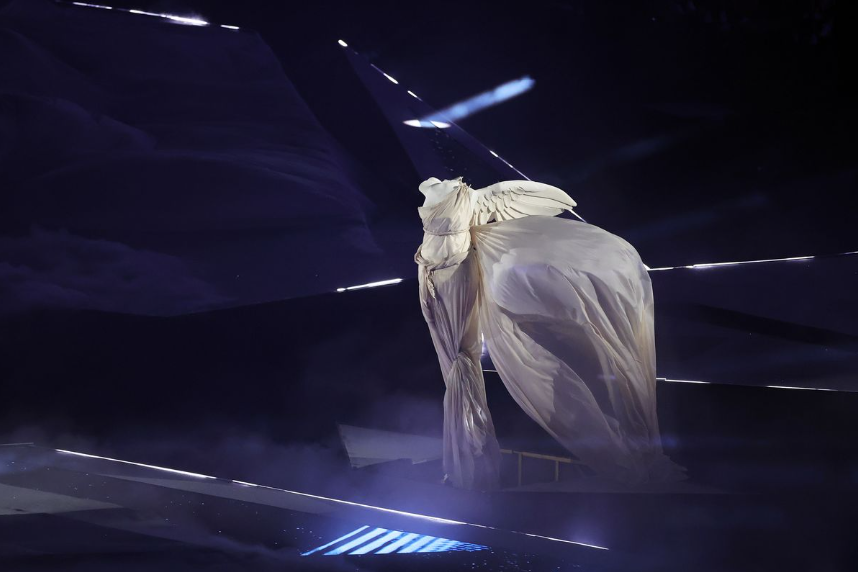
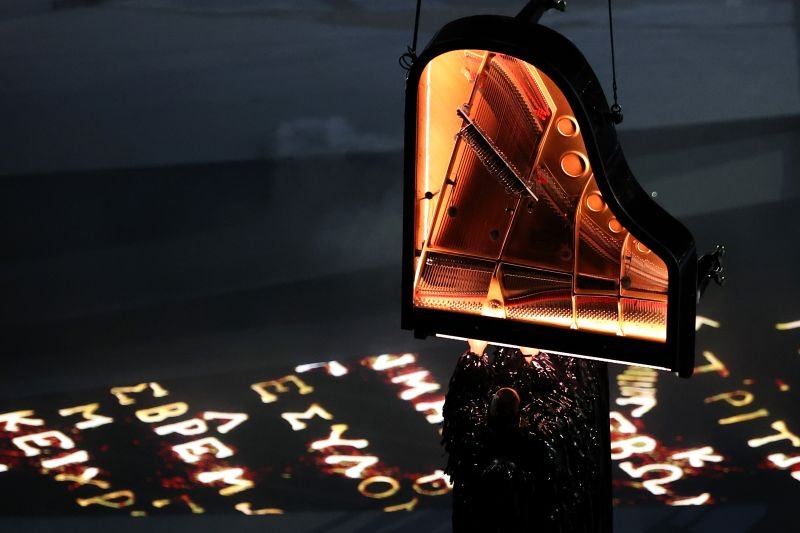
Credit: Comité d’organisation des Jeux Olympiques et Paralympiques de 2024 via Linkedin
The Olympic Anthem: A Testament to Greece’s Enduring Legacy
As we reflect on the vibrant festivities of the 2024 Paris Olympics, it is fitting to spotlight another quintessential Greek element of the Games: the Olympic Anthem. Composed by Greek opera composer Spyridon Samaras (1861–1917) and set to lyrics by Greek poet Kostis Palamas (1859–1943), this anthem has become a cornerstone of Olympic ceremonies, embodying the ideals of unity and excellence that define the Games.
First performed at the inaugural 1896 Athens Games, the Olympic Anthem has been a staple at modern Olympics, often presented in multiple versions to accommodate the diverse languages of participating nations. This musical tribute not only celebrates Greece’s historical contributions but also reflects the global unity that the Games strive to promote. Below, you will find the original Greek lyrics and their English translation:
The Olympic Anthem – Greek Original
Αρχαίο Πνεύμα αθάνατο, αγνέ πατέρα
του ωραίου, του μεγάλου και του αληθινού,
Κατέβα, φανερώσου κι άστραψε εδώ πέρα
στη δόξα της δικής σου γης και τ’ ουρανού.
Στο δρόμο και στο πάλεμα και στο λιθάρι
Στων ευγενών αγώνων λάμψε την ορμή
Και με το αμάραντο στεφάνωσε κλωνάρι
και σιδερένιο πλάσε και άξιο το κορμί.
Κάμποι, βουνά και θάλασσες φέγγουνε μαζί σου
σαν ένας λευκοπόρφυρος μέγας ναός.
Και τρέχει στο ναό εδώ προσκυνητής σου
Αρχαίο Πνεύμα αθάνατο, κάθε λαός.
The Olympic Anthem – English Translation
O Ancient immortal Spirit, pure father
Of beauty, of greatness and of truth,
Descend, reveal yourself and flash like lightning here,
within the glory of your own earth and sky.
At running and at wrestling and at throwing,
Shine in the momentum of noble contests,
And crown with the unfading branch
And make the body worthy and ironlike.
Plains, mountains and seas glow with you
Like a white-and-purple great temple,
And hurries at the temple here, your pilgrim,
O Ancient immortal Spirit, every nation.
You may listen to the Olympic Anthem as it was sung in Greek at the opening ceremony of the Paris Olympics 2024 by clicking here.
Echoes of the Past, Lights of Tomorrow
With the final applause of the 2024 Paris Olympics fading, Greece’s ancient traditions continue to illuminate the present. The eternal flame and the universal resonance of the Olympic Anthem are threads that weave Greece’s enduring legacy into the ever-evolving narrative of the Games.
As we bid farewell to Paris, we’re reminded that the spirit of the Olympics, inspired by Greece’s rich heritage, illuminates not just the current era but also the future of the Games. What new chapters will be written, and how will the timeless ideals of unity and excellence evolve in the years to come? Greece’s influence remains a guiding light, challenging us to uphold the Olympic ideals and celebrate our shared journey toward a brighter, more interconnected future.









